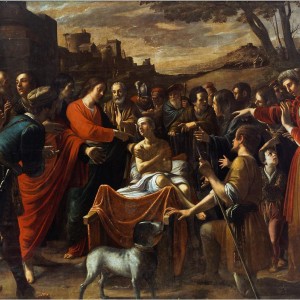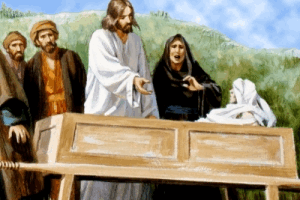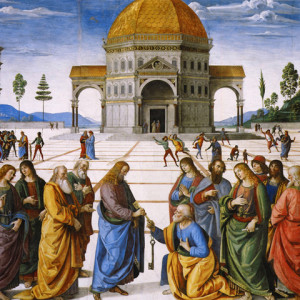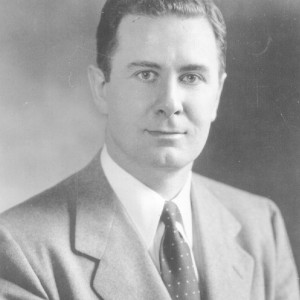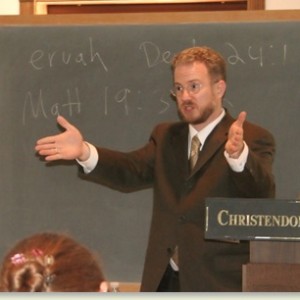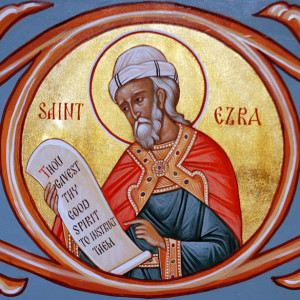I mentioned yesterday that Luke 7:11-17, in which Jesus resurrects the son of the widow of Nain, “is important for a number of reasons, not least of which is that Jesus raises the son out of love for the mother. There’s an obvious Marian element to this — given that Jesus has mercy on all… Continue reading The Widow of Nain and the Virgin Mary
Tag: Bible
The Raising of the Widow’s Son, and What it Says About God’s Love
Given how important today’s Gospel is, it should be much better known. After all, it involves Jesus raising a man from the dead, something which happens extremely rarely, even in the Gospels. It’s Luke 7:11-17, the raising of the widow’s son: Soon afterward He journeyed to a city called Nain, and His Disciples and a large… Continue reading The Raising of the Widow’s Son, and What it Says About God’s Love
More Sketchy Translations by the NIV
In an earlier post, I talked about how the NIV (which I generally like) plays unfortunate sectarian games with its translations. The example I gave was this one: the word paradosis means “tradition,” and the NIV translates it as “tradition” when its used in a negative sense in Scripture (when Christ condemns the Pharisees’ adherence to traditions… Continue reading More Sketchy Translations by the NIV
Is the “Rock” Peter, or His Faith?
HocCogitat asked, in response to Part V of my series on the role of St .Peter in Scripture: But even Augustine holds that Christ was referring to Peter’s confession as the rock, not his person. And this is obviously the only reasonable interpretation because Christ calls Peter Satan later in the same chapter. Obviously, what… Continue reading Is the “Rock” Peter, or His Faith?
Mark Driscoll and Gerry Breshears’ Faulty Case for the Protestant Canon
A reader e-mailed me a few questions regarding arguments raised by Mark Driscoll and Gerry Breshears, in their book Doctrine: What Christians Should Believe. It’s a good example of how important it is to check out the facts of those people trying to disprove Catholicism. For example, they start out their argument for the Protestant Bible… Continue reading Mark Driscoll and Gerry Breshears’ Faulty Case for the Protestant Canon
Was Judas a Real Person?
Places like the History Channel and certain liberal theology programs float wild ideas about the Bible and early Christianity. Many good Christians hear these ideas and quietly struggle with them. To ask them aloud seems heretical, but precisely because we’re afraid to talk about that, the questions never get answered. So we end up with… Continue reading Was Judas a Real Person?
The Problems of Free Will, Evil, and Hell
Today, I want to talk about probably the three most important interrelated problems facing Christianity: the problem of free will, the problem of evil, and the problem of Hell. These are not only the issues which drive people away from Christianity, but they’re issues which have divided even Christians, with some Christians denying that free… Continue reading The Problems of Free Will, Evil, and Hell
Young Earth Creationism, and the Danger of Needless Barriers to the Faith
In Isaiah 44:24, amongst other places, the prophet Isaiah says that God formed us in the womb. Imagine a Christian taking this to mean that sex had nothing to do with procreation. Loudly proclaiming that you had to choose either the word of God (which says God formed you in the womb) or science (which says… Continue reading Young Earth Creationism, and the Danger of Needless Barriers to the Faith
Why Did the Law of Moses Exist?
I’ve been listening to a very good talk on Galatians 2-5 given by Christendom College’s Professor Eric Jenislawski called “Saint Paul’s Galatians: Are You Saved?” That talk, and countless others, are available free on the Institute of Catholic Culture’s website. In it, he poses the question: Given how emphatically St. Paul denies that the Law of Moses can save us,… Continue reading Why Did the Law of Moses Exist?
Did the Council of Carthage Have One Book Too Many?
In one of the comments on my earlier post, “Answering Nine Protestant Arguments About the Bible,” a reader named Drew asks is the Council of Carthage considered as canonical the apocryphal book sometimes called “Greek Esdras” (also known, confusingly enough as 1 Esdras, 3 Esdras, and Esdras A). The reason there are so many different confusing… Continue reading Did the Council of Carthage Have One Book Too Many?
